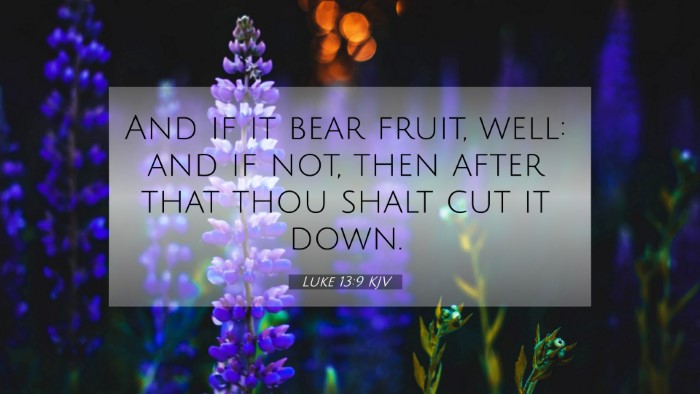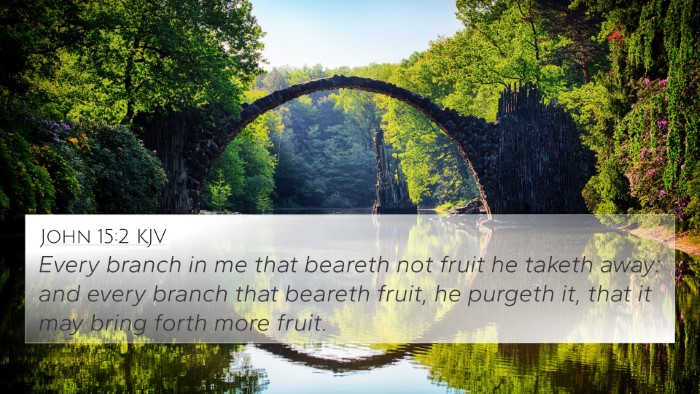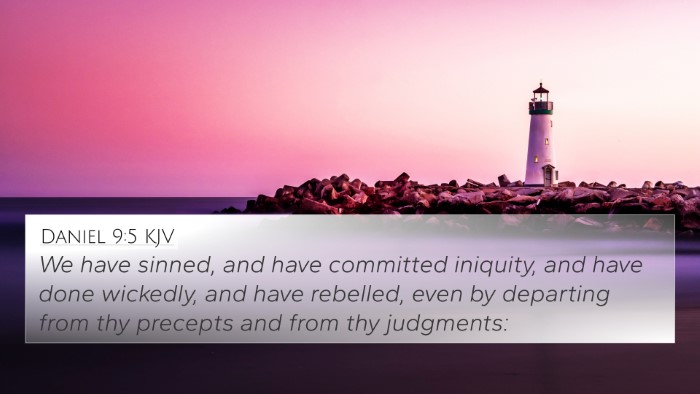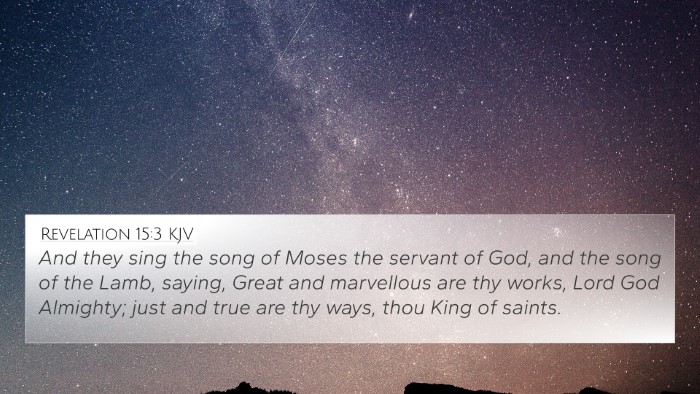Understanding Luke 13:9
Luke 13:9 states, "And if it bear fruit, well: and if not, then after that thou shalt cut it down." This verse serves as a profound metaphor illustrating God's patience and expectation, particularly regarding spiritual productivity.
Summary of Commentary Insights
Several public domain commentaries provide rich interpretations of this verse. Below, we summarize critical insights from Matthew Henry, Albert Barnes, and Adam Clarke:
Matthew Henry's Commentary
Henry emphasizes the significance of the vineyard as a representation of Israel, God's chosen people. The keeper of the vineyard symbolizes Christ, who intercedes for His followers, seeking to cultivate spiritual fruits in their lives. The act of cutting down the tree signifies divine judgment for unfruitfulness.
Albert Barnes' Commentary
Barnes highlights that the phrase "bear fruit" pertains to genuine repentance and good works—essential aspects of a believer's life. He suggests that this message conveys a serious warning about the consequences of spiritual barrenness. The timeframe within which the tree must produce fruit represents God's patience allowing time for spiritual growth.
Adam Clarke's Commentary
Clarke focuses on the intercessory role of the gardener, which symbolizes Christ Himself, highlighting Christ’s plea for mercy and the opportunity for repentance. He further critiques the fruitless tree's persistent barrenness, drawing parallels to individuals who receive God's grace yet fail to bear the expected fruits of righteousness.
Key Themes and Connections
- God's Patience: The verse illustrates God's longsuffering nature, allowing time for repentance.
- Judgment: It foreshadows divine judgment awaiting those who fail to produce spiritual fruits.
- Intercessory Role of Christ: Emphasizes the role of Christ as a mediator urging for mercy on behalf of sinners.
- Expectations of Believers: Highlights the expectation that a true believer must show evidence of faith through actions.
Bible Verse Cross-References
- Matthew 3:10: "And now also the axe is laid unto the root of the trees: therefore every tree which bringeth not forth good fruit is hewn down, and cast into the fire."
- John 15:2: "Every branch in me that beareth not fruit he taketh away: and every branch that beareth fruit, he purgeth it, that it may bring forth more fruit."
- Romans 2:6: "Who will render to every man according to his deeds."
- Galatians 5:22-23: "But the fruit of the Spirit is love, joy, peace, longsuffering, gentleness, goodness, faith, Meekness, temperance: against such there is no law."
- Revelation 2:5: "Remember therefore from whence thou art fallen, and repent, and do the first works; or else I will come unto thee quickly, and will remove thy candlestick out of his place, except thou repent."
- Hebrews 6:7-8: "For the earth which drinketh in the rain that cometh oft upon it, and bringeth forth herbs meet for them by whom it is dressed, receiveth blessing from God: but that which beareth thorns and briers is rejected, and is nigh unto cursing; whose end is to be burned."
- James 2:26: "For as the body without the spirit is dead, so faith without works is dead also."
Applying the Insights
In applying the teachings from Luke 13:9, believers are encouraged to reflect on their own spiritual fruitfulness. This verse invites individuals to consider:
- Are they actively living a life that reflects their faith?
- What actions or "fruits" demonstrate their commitment to God?
- How can they ensure they are nurturing their spiritual growth?
Thematic Bible Verse Connections
Furthermore, this verse can be linked to various biblical themes such as:
- Spiritual accountability and responsibility
- The warning of spiritual apathy
- The urgency of responding to God’s grace
Final Thoughts
Luke 13:9 serves not merely as a historical account but as a timeless warning and an encouragement for all believers. By understanding its meaning through the lens of respected commentaries, one can appreciate the depth of God's expectation for us to bear fruits worthy of repentance. Embracing the narrative of this parable allows believers to engage in a deeper relationship with God, fostering a more fruitful spiritual life.










